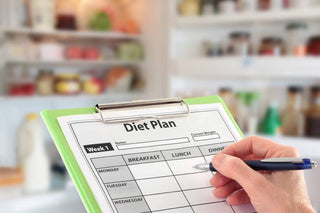Three simple strategies may hold the key to weight-loss success for postmenopausal women: keeping a food journal, not skipping meals, and avoiding eating out.
That’s what the newest study in the Journal of the Academy of Nutrition and Dietetics suggests, and it echoes long-held ideas about what works for weight loss.
For the study, 123 overweight or obese postmenopausal women, all between the ages of 50 and 75, were evaluated for changes in body weight over the course of a year. At the start of the study, the participants’ average body mass index (BMI) was 31.3.
Researchers from the National Cancer Institute, the University of Washington, the Fred Hutchinson Cancer Research Center, and the University of Minnesota who collaborated on this study, separated the women into two diet groups: calorie-reduction or diet plus exercise. Participants were required to fill out questionnaires about what they ate, eating patterns, and eating habits, including whether they kept food journals or ate at restaurants.
At the end of the one-year study period, the average weight loss was 11 percent of starting weight for women in all groups – 19 pounds. However, there was a marked difference in how much weight was lost based on certain behavior patterns.
The greatest weight loss came for women who tracked everything they ate in food journals or diaries, and they lost about six pounds more than those who did not.
Women who skipped meals lost less weight – eight pounds less on average – than those who ate meals regularly.
Women who ate out frequently also lost less weight, and surprisingly, lunch rather than dinner, was the meal associated with the least weight loss. Eating lunch at a restaurant once a week led to about five pounds less of weight loss.
These results are good news because they show that “basic strategies, such as maintaining food journals, eating out less often, and eating at regular intervals are simple tools that postmenopausal women – a group commonly at greater risk for weight gain – can use to help them lose weight successfully,” said lead researcher Dr. Anne McTiernan.
The Bottom Line
Based on personal experience, I would agree that journaling, not eating out and not skipping meals are keys to weight loss success regardless of your sex or age.
By keeping a food journal, we become meticulously aware of how many calories we’re taking in, learn how many extra calories we are consuming and what foods are hindering our weight-loss. Journaling also helps to pinpoint unhealthy behaviors that promote weight gain such as “seconds”, late afternoon snacking, or sweetened beverages.
In an age where technology has become so integrated into our lives, keeping track of our diet is even simpler by utilizing an online program or smartphone app. Our reviews of popular diet tools is a great place to start.
10 Best Weight Management Tools
Skipping meals is not a good weight loss strategy because while we might equate it with consuming fewer calories, it often results in the dieter getting too hungry and overeating at the next meal as a result. It makes more sense to have a smaller, nutritionally-balanced meal with protein and fiber to keep you satiated until the next meal.
Avoidance of eating out (breakfast, lunch or dinner) and not relying on take-out (just as bad) is key to manage portion control (calories), fat and sodium. Restaurant portion sizes are way too big and their one-size-fits-all serving, sets women up for weight loss failure.
So, that means if you opt to dine-in more, you need to plan meals ahead of time and allow more time for cooking. You’ll need to shop more frequently to buy fresh fruits & veggies to have on hand for those “need-something-quick” moments.
Signing up for a Community-Supported-Agriculture (CSA) program can make things easier as well. CSAs deliver farm-fresh, in-season fruits and vegetables to your door weekly or bi-monthly, usually at terrific prices, and they can introduce more fruits and veggies to our diets and make us plan our meals around what we receive. Learning more about cooking can turn this responsibility into a fun hobby, too.
Of course, avoiding eating out is unrealistic. It’s a part of being social, and sometimes we just need a break from making food at home. The key is to cut back and when you do go out to eat, plan ahead how you’re going to tackle the temptation.
Some recommendations:
- don’t go starving (e.g., at an apple ahead of time)
- plan ahead how you’re going to handle your triggers e.g., chips & salsa, large portions, bread, dessert, and even drinks
- Share an entrée with your friend or spouse
- politely decline bread when served
- limit sweetened or alcoholic beverages
- substitute starchy sides for a side of salad, veggies or fruit
- opt out of dessert, and have some fruit back at the office instead
- ask for a take-out container ahead of time; halve the extra-large portion and eat for dinner later

